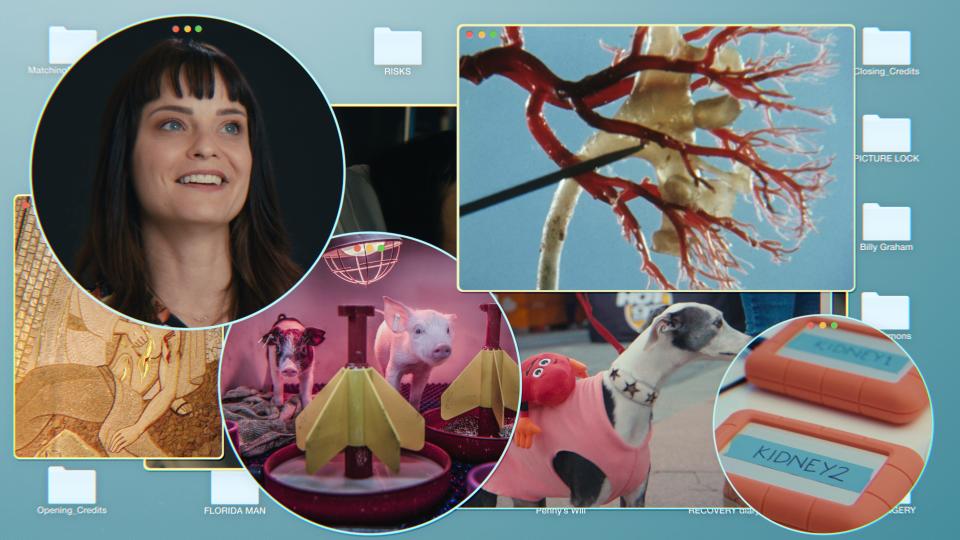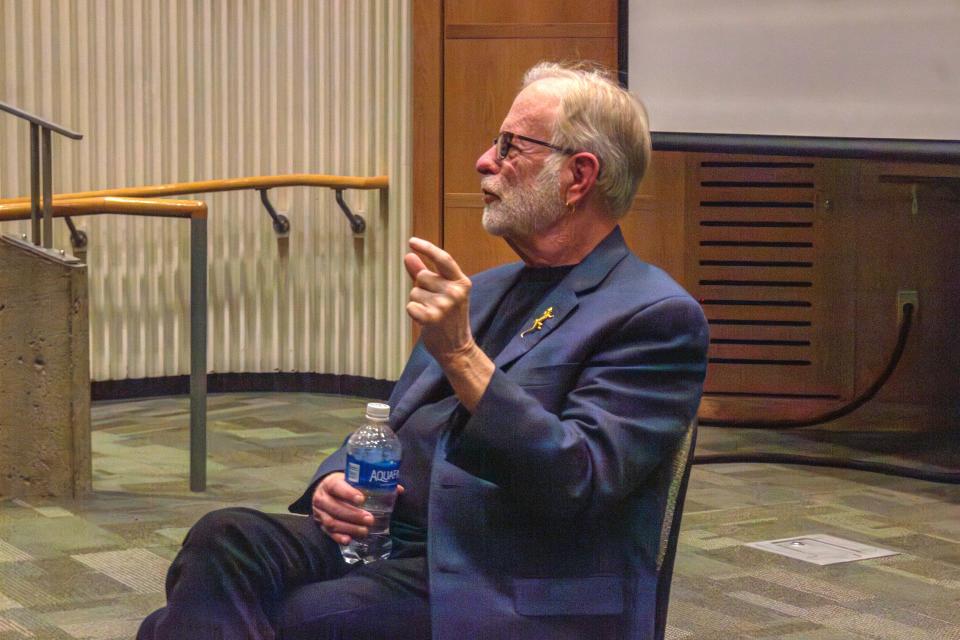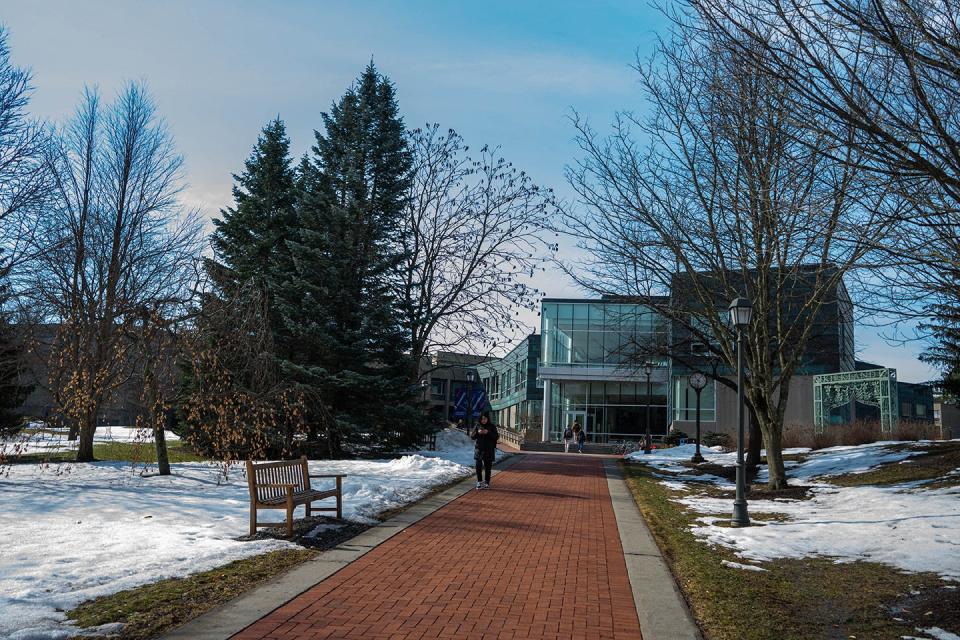Hamilton College F.I.L.M. series will explore a unique spectrum of cinema
For documentary filmmaker Penny Lane (yes, that is her real name), the decision to donate a kidney to a stranger was easy. On the other hand, the decision to make a film about her own experiences with that process was one she agonized over.
Lane always aims to surprise both herself and her audiences, and to approach subjects in a manner that subverts expectations. For the documentary about her kidney donation, "Confessions of a Good Samaritan," her method was no different.
“You hear that logline, and you're kind of like, ‘Oh, I kind of see what that would be,’” Lane said. “It sounds preachy, it sounds really twee or sweet or something. And so the entire approach to that film had to be whatever the opposite of those things would be, the opposite of preachy."
"So instead of my character being someone there to lecture you about what a good person I am, the whole film is just you watching me basically melt down and wonder if I'm a good person and what that even means. Questioning my own decisions, questioning my own morality is the route that I would take, because it's the opposite of what you might expect.”

F.I.L.M. series
“Confessions of a Good Samaritan” will be featured in Hamilton College’s F.I.L.M. series this semester. The series was first conceived of by Hamilton film professor and chair of cinema and media studies Scott Macdonald over 30 years ago and is still curated by him to this day.
Lane’s documentary will appear alongside a diverse array of off-the-beaten path films, from the international to the experimental, exploring topics ranging from the biology of moths to Vietnam War propaganda. The series is free and open to the public, and will take place some Sundays at 2 p.m. (find specific dates on this calendar of events by searching “film”) in the Bradford Auditorium in the Kirner-Johnson Building.
MacDonald wants to give students a hands-on learning experience. Or, in this case, eyes-on.
“It's a little bit like music,” MacDonald said. “If you're studying music, you have to have public events. I feel that way about film too – if you're studying film, and it's more true now than ever, you need to do something outside the classroom. I feel the need to make stuff available that people wouldn't otherwise have a chance to see.”
The acronym F.I.L.M. stands for “Forum on Image and Language in Motion.” One reason that MacDonald devised this title was that he simply wanted to make the word film into an acronym; he also wanted to convey the interactive, discussion-based elements of the series.
“I wanted to distinguish this set of events from other film events that are on campus,” MacDonald said. “It signals that it’s not just a screening. Often the filmmakers are present, or in some cases, teachers and scholars talk about the film.”
Film across disciplines, perspectives
This semester, film selections will tie into various aspects of Hamilton College’s curriculum beyond cinema and media studies, bringing in scholars from other departments such as history and biology.
Professor Martine Guyot-Bender, scholar of French literature and film, will be presenting French director Samuel Aubin and his film “La Chambre noire de khuong,” or “Khuong Mê’s Dark Room: His Life and His Work” in English on Sunday, April 14. The film is Aubin’s attempt to recount the life of Vietnamese filmmaker Khuong Mê, who created propaganda films supporting his country’s independence during the Vietnam War.
Guyot-Bender discovered the film and ended up writing the English subtitles for it while doing research in Cambodia under a fellowship funded by the Center for Khmer Studies.
Guyot-Bender’s scholarship currently focuses on social documentaries of the working class and war. She studies topics such as French film collective Slon/Iskra’s account of the May 1968 working class revolution in France and Cambodian refugee Rithy Panh’s documentation of the genocidal Khmer Rouge regime, which killed his family.
In translating Aubin’s film, Guyot-Bender found that it dovetailed with her interests and her teaching.
“As I was doing this, I discovered that the film very much touched on questions that I teach in my French upper level seminar, which is on representations of war,” Guyot-Bender said. “It's not necessarily about war being bad or good, but it's about, how do you represent the experience of war? And this film talks about this for the Vietnam War – how do you represent the Vietnam War?”
Guyot-Bender and Aubin will co-lead a discussion and Q and A session after the screening. Guyot-Bender finds the multilayered perspectives of the film fascinating, both in the focus on the life of a propagandist enduring war and in Aubin’s attempts to tell the story of that life.
“Samuel Aubin’s comments are very deep in terms of questioning what it is to film somebody else's life,” Guyot-Bender said. “What do you choose? How do you organize the story, which is chaotic, because every story is chaotic? And how do you make sense of it? And the end of the movie says, ‘I came with my idea, and I got a different idea at the end.’ And you can't really film somebody’s life. It's always going to be fiction. Even though it's a documentary, it's always fiction.”
In documenting her own life, something she has never done for a feature film, Lane also found the process of selection and organization to be a fraught one. She tries to keep the spark of excitement for filmmaking alive by constantly tackling new challenges, but said that she doesn’t intend to make another film about herself anytime soon.
“It was just so agonizing, in making these decisions you have to make every day about what to put in, what to cut out, what piece of information about me do you need to know or not need to know, what’s relevant here,” Lane said. “It was so hard. It was so much harder than normal, because I didn’t want to just be self-serving, I wanted to serve the film, but I also didn’t want to ruin my life or ruin the lives of anyone close to me.”

The experimental and the historical
Lane has known MacDonald for many years, and calls him a luminary in the world of experimental film. The F.I.L.M. series commenced Sunday with a selection from that world: Godfrey Reggio’s bizarre fantasia "Once Within a Time."
MacDonald selected the film because he finds that many of his students are enthralled by fantasy. He said that Reggio is a deeply influential experimental filmmaker.
“He makes very unusual, interesting work,” MacDonald said. “And he’s now 83, and I think he's thinking of this as his final film. But it's on some level aimed both at children and at people that just love fantasy work. A number of surprising characters show up in the film.”
The series will close out with Hamilton College professor of Russian history and culture Jason Cieply presenting Ukrainian filmmaker Sergei Loznitsa’s archival documentary "State Funeral" on April 28.
Loznitsa is an influential Ukrainian filmmaker who made headlines in 2022 when he was ejected from the Ukrainian Film Academy for opposing boycotts of Russian filmmakers. “State Funeral” includes historical footage from The Great Farewell, a tribute to Joseph Stalin produced by the Soviet Union upon Stalin’s death in 1953. In his film, Loznitsa exposes and critiques the intensity of the cult of personality surrounding Stalin.
“Loznitsa made just an astonishing film about the Stalin funeral using the original footage,” MacDonald said. “It's an incredible film to watch. He lists some of the failures of the Stalin dictatorship. So it's a powerful, beautiful film that has a lot to say.”

The dance of meaning
Lane has presented her films at Hamilton College in years past, and said that the Q and A portion of the screenings is far and away her favorite part.
“I mean, you just have no idea what you made until you get audience feedback,” she said. “The finished film and an audience of strangers is the real test. People see things in it that you didn't intend or that you didn't know were there.”
Both Lane and MacDonald said that the special thing about film as an art form is that it actually combines many other art forms.
“There's a certain kind of truth that an image can have that is very different from the kind of truth that a spoken statement or a written statement can have,” Lane said. “They don’t operate the same way. But in film, you’re doing both. And so it’s this kind of endless dance between the meaning that you’re creating with, let’s say, the dialogue and the meaning that you're creating with the mise-en-scène and what's in the frame, and the meaning you’re creating with the edit and the music and the sound. It's such an incredibly potent mix of forms of expression all combined.”
MacDonald was a professor of literature before he was a professor of film, and finds that those disciplines are deeply connected.
“I think film is music, it’s language, it’s photography,” MacDonald said. “It combines the other arts in a way that I think no other form really does. So I stopped teaching literature, but there's a lot to read about a lot of the films I show. Film can comprehend language, even if language can't quite comprehend film. It's an ever-expanding wonderful passion, excitement, intellectual stimulation.”
This article originally appeared on Observer-Dispatch: Hamilton College FILM series features diverse array of films

